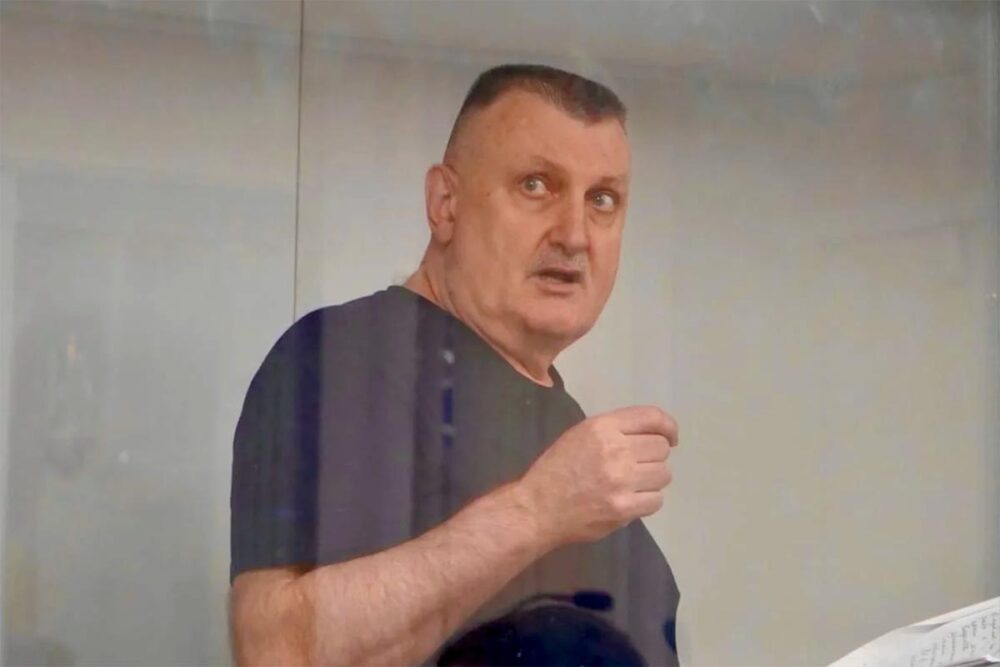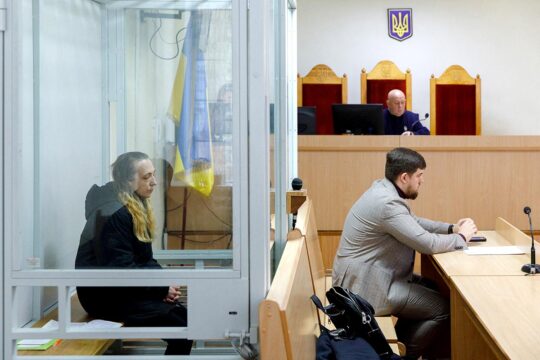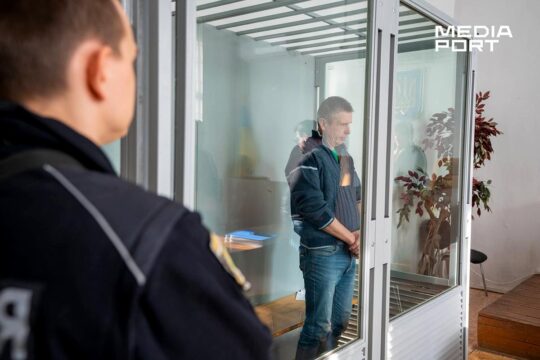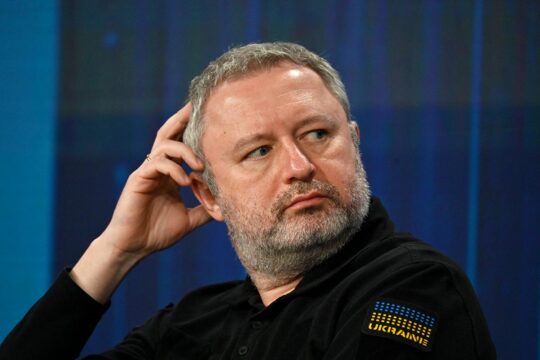On November 7, 2020, at 5 a.m., former deputy chief of the Crimean Ministry of Internal Affairs (MIA) Mykola Fedorian was detained at the Kalanchak checkpoint in Kherson oblast, southeastern Ukraine. Fedorian had retired at the end of 2011 and since 2012 he had been working at the state-owned company Chornomornaftogaz in the transport department. After the annexation of Crimea by Russia in 2014, he stayed there, received a Russian passport and continued to work for the now Russian state-owned company Chernomorneftegaz (same name but in Russian), which was created by the occupiers from the seized Ukrainian company.
Fedorian did not cut his ties with Ukraine. He maintained his Ukrainian citizenship and occasionally visited his elderly parents in the village of Nyzhni Petrivtsi, Chernivtsi oblast. In 2019 he even came to Ukraine to renew his passport.
On that morning of November 2020, Fedorian was on his way back to Crimea by bus from Chernivtsi, when something went wrong at the checkpoint. An officer from Ukraine’s security services (SBU) invited him to a separate room for a chat. The mobile phone from the MIA retiree would soon be seized and become key evidence in a criminal case against him. Fedorian kept records of his conversations with employees of Chernomorneftegaz and border guards who assisted him in crossing the border with Crimea. He also had a photo of him together with the commander of the National Guard of Ukraine, Mykola Balan. As it turned out, they were old friends. They had served together in the police in Sudak in the past, and their families developed a close friendship. Balan allegedly provided travel assistance to Fedorian and his relatives between Ukraine and occupied Crimea. Around 8 a.m., Fedorian sent a text message to Balan: “Mykola, help, SBU”.
Law enforcement officials disclosed photos of medals and certificates from the Russian authorities for participation in the referendum and parade in Crimea discovered on Fedorian’s phone, as well as parts of his correspondence with the Russian Federal Security Service (FSB) officers. Ukrainian media soon burst with headlines about the detention of the “traitor”.
Providing vehicles to Russia’s FSB
Fedorian was accused of providing vehicles of Chernomorneftegaz to the FSB and other law enforcement agencies of the Russian Federation at least 12 times for the purpose of conducting so-called investigative measures and transporting illegally detained Ukrainian citizens to detention centres under the pretext of fighting the terrorist organisation Hizb ut-Tahrir.
Hizb ut-Tahrir is an international Islamic party, mostly active in Central Asia. Though it was declared a terrorist organisation by the Russian Supreme Court in 2003 and by the UK in 2024, it is not prohibited in Ukraine and most countries in the world. According to the NGO Crimea SOS, after the annexation of Crimea more than 100 Ukrainian citizens were politically persecuted for their alleged affiliation with Hizb ut-Tahrir. They have been sentenced by Russian courts to prison terms ranging from 8 to 20 years.
Fedorian sent messages to FSB officers regarding the provision of vehicles on March 25, 27, 28, 30, April 10, June 6, August 12, September 16, October 9, December 13, 2019, as well as on July 15 and August 21, 2020, according to court files. The WhatsApp correspondence suggests that a Russian FSB officer had contacted Fedorian and indicated the required number of buses. Fedorian, in agreement with the director of Chernomorneftegaz, Alexander Kuznetsov, instructed a subordinate employee to find available vehicles and drivers. He then sent the list of buses and drivers to the FSB officer and informed the drivers where they had to go. Investigators compared these dates with those of searches conducted on pro-Ukrainian activists and Crimean Tatars, as evidenced by media reports and photographs.
A negative experience with Ukraine’s SBU
As a result of searches conducted by the FSB on March 27-28, 2019, 15 Ukrainian citizens of Crimean Tatar ethnicity were illegally detained and placed in a pre-trial detention centre in Simferopol. On June 10, 2019, at least 5 searches took place, and four people were detained. The video of the search at the Crimean Solidarity movement of Riza Umerov shows a white minibus with the licence plate A048ХK, matching the vehicle from the list sent by Fedorian. Subsequently, a Russian court sentenced Umerov to 13 years in prison for participation in a terrorist organisation. On August 21, 2020, Chernomorneftegaz provided the FSB with vehicles to seize a 12-metre-long trailer from the Crimean Tatars and transport it from the village of Zolote to Simferopol.
Prosecutor Andrii Maga is convinced that Fedorian, given his 30 years of experience in law enforcement, must have known the intentions of the Russian special service. Namely, that the FSB is not the same as the police. In accordance with the Geneva Conventions, only the police are in charge of maintaining order in the occupied territory. Instead, the FSB is enforcing the policies of the occupation authorities.
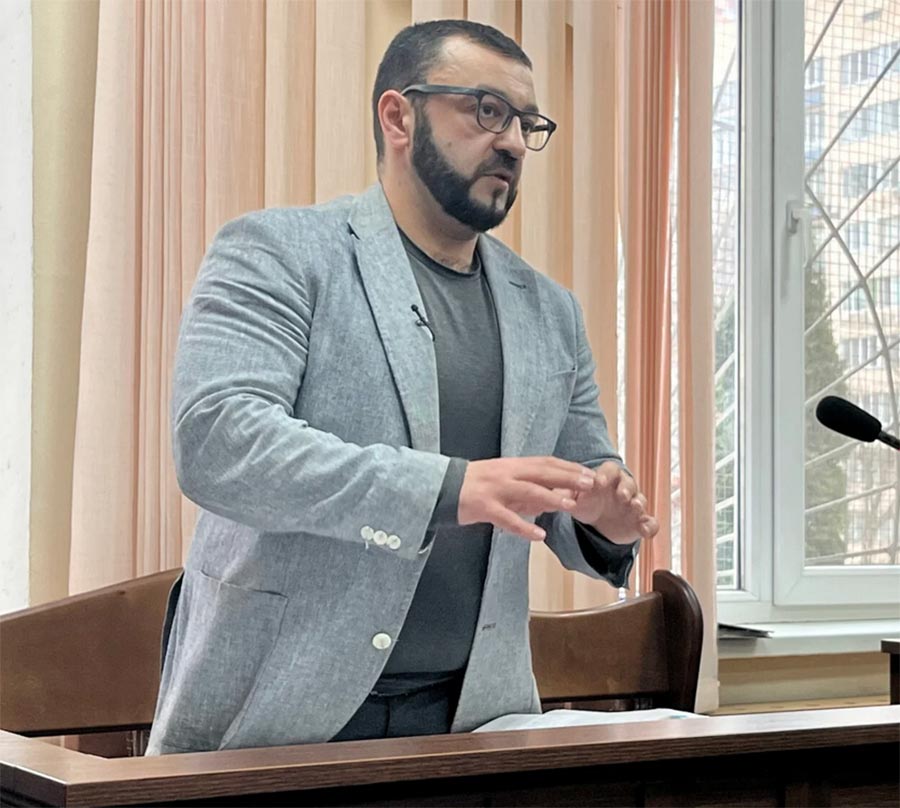
Before the annexation of Crimea, while working at Chornomornaftogaz, Fedorian provided similar services to Ukraine’s SBU but he had a negative experience and was resentful after he was suspended for refusing to supply vehicles. He told the court that in 2013 the company’s new CEO instructed him to provide a helicopter to certain individuals without an official request. The helicopter cost more than $10,000, so Fedorian refused. As a result, he was suspended for a month, subjected to an internal investigation before being reinstated. Then, in 2014, there was another request to provide a helicopter. Fedorian refused once again and was demoted from department head to deputy department head, only to be reinstated afterwards.
“I never served Russia. I served the Soviet Union”
Fedorian is 64 years old. He talked proudly about being born into a working-class Romanian family, graduating with a gold medal (a distinction given to children with excellent grades) from high school, receiving two degrees in history and law, and working in the police for most of his life. He built a career from a policeman to the deputy head of the Main Department of the Ministry of Internal Affairs of the Autonomous Republic of Crimea and the head of public security, from sergeant to colonel. He pointed out that he has achieved everything on his own, without any patronage.
“Those of us who worked at that time remember the conditions in which we were working at the dawn of Ukraine’s independence. Long periods without salaries, without a place to live, in rented flats and dormitories. I lived in a dorm for 14 years. It was nice to go on a holiday in Crimea, but working there was very difficult. Yet we diligently defended the interests of Ukraine and its citizens, remaining loyal to our oath,” he said in court.
Fedorian cannot be called a sympathiser with Ukraine. Communicating by phone with the Russians, he was using “derogatory” terms such as “Khokhly” [pejorative for “the Ukrainians”] when talking about the Ukrainian authorities who run the checkpoint between Crimea and the territory controlled by Ukraine, also saying that “they don’t like us on the other side, put us into observatories”. [During the Covid pandemic, people crossing the border were often placed into quarantine facilities called “observatories”.]
The correspondence suggests that “Pavel FSB” thanked him for the vehicles, and Fedorian replied with “We serve Russia”. On December 20, 2019, Fedorian also congratulated the FSB officer Valeriy on the Day of the Russian State Security Service. However, during the trial held in Kyiv in the midst of a full-scale war between Russia and Ukraine, Fedorian did not openly express his support for Russia. When interrogated, he evaded the prosecutor’s questions about the events that took place in Crimea in 2014, arguing that it was not relevant to the case. He categorically denied having written “We serve Russia”, saying that the SBU officers had falsified the correspondence to discredit him.
“I never served Russia. I served the Soviet Union. To this day, whenever someone says something to me, I say: ‘I serve the Soviet Union’ – a common expression as a reply after having done a favour to someone, meaning ‘it was my duty’”.
In his statement, Fedorian voiced some resentment towards the Ukrainian authorities: “The explosion of the main electrical power line, the shutdown of the electricity supply to Crimea, the interruption of the water supply to Crimea through the North Crimean canal, the food blockade and so on, these actions can be qualified as genocide of our citizens, who ended up in this situation through no fault of their own,” he told the court. “It is an attempt to destroy the population of Crimea. The population of Crimea perceived these actions as a rejection by Ukraine of the Crimean citizens. After ‘passportisation’ [the forced issuance of Russian passports to Ukrainian citizens] (...), people started to consider themselves citizens of the Russian Federation, keeping their [Ukrainian] passports to travel to the mainland of Ukraine to visit their relatives. Except in words, Ukraine has not made any political move to regain Crimea. There is not a single word about Crimea in the signed Minsk agreements [between Ukraine and Russia in 2014 and 2015]. At the end of 2020/beginning of 2021, all operational documentation of military units withdrawn from Crimea was destroyed. This was done so that those responsible for the consequences of the events of 2014 would not be found. In these circumstances, I consider it cynical to accuse the Crimeans of treason against Ukraine,” stated Fedorian defiantly.
Questioning the investigation
Fedorian pleaded not guilty and labelled the case as political. He openly mocked the prosecution, pointing out that the entire case was solely built on information from his phone and that investigators were unable to find anything else. The SBU officers have allegedly been looking for former employees of the Crimean police and tried to convince them to give incriminating testimony against Fedorian, but they refused. Only one of them testified but did not reveal anything interesting. In total, 12 people were interrogated during the pre-trial investigation, including neighbours of Fedorian’s parents in the Chernivtsi oblast, but no one was subsequently summoned to court.
During the pre-trial investigation, a certain Ilia Zvarych said that he had heard about Fedorian. A Ukrainian citizen, Zvarych worked for Chernomorneftegaz as a watchman and was served with a suspicion notice by the Ukrainian judiciary in September 2020 for violating the regulations on entering the temporarily occupied territory of Crimea. In February 2021, he was sentenced to a 1-year suspended sentence after pleading guilty and agreeing to cooperate with law enforcement in the criminal proceedings against Fedorian. He was not questioned in court. Fedorian claimed that Zvarych’s testimony was false.
The accused strongly criticised the results of the investigation, saying that the SBU had illegally used information from his phone, that it had been practically yanked from his hands and that there had been no permission from the investigating judge allowing access to his mobile phone. He argued that the information in the phone was partially forged – that some words were added by SBU. But in general, he did not deny the correspondence with the FSB. He explained that in early March 2019, Kuznetsov, CEO of Chernomorneftegaz, said during a briefing that he had given Fedorian’s phone number to an FSB officer named Pavel. He said that the latter could call and, as Kuznetsov agreed to, it would be necessary to transmit instructions to the head of the Department of Technological Transport and Special Equipment, Yuriy Achkinazi, to provide vehicles for the operational headquarters. In September 2019, Pavel gave Fedorian the contact information of another FSB officer, Valeriy, saying that whenever he would be unavailable, Valeriy would call. According to the case file, the man in question is Valeriy Tereshchak, a former SBU officer who worked in Dzhankoi, in the northern part of Crimea. He is believed to be one of the 1,300 SBU officers who betrayed their oath and joined the occupation authorities in Crimea.
Not knowing why vehicles were needed
Fedorian insists that neither he nor his boss Kuznetsov had the slightest idea what the vehicles were being assigned for. He says that the security service has never disclosed anything, and that should be obvious to anyone familiar with the specifics of investigative work. However, he also explained that Kuznetsov had very close relations with the FSB, as his parents were former USSR KGB employees.
In court, Fedorian went into considerable detail about how the vehicles were provided, trying to demonstrate that he was only an intermediary, a ’courier’. He was the head of the Transport Department, managing documents and purchasing vehicles. It was the Department of Technological Transport and Special Equipment, managed by Yurii Achkinazi, that was responsible for the vehicles’ storage and provision, he explained.
Fedorian also claims that there is no evidence of the Chernomorneftegaz vehicles’ involvement in the searches. The Crimean Solidarity video managed to identify only one vehicle by its licence plate number. In December 2019, the vehicles were allegedly provided for the transportation of KGB and SBU veterans on the occasion of the Day of the Russian Federation Security Service. At the request of Fedorian’s defence lawyer, the Russian state-owned company Chernomorneftegaz provided reports establishing that 8 out of 12 requests for vehicles mentioned in the indictment had not been fulfilled.
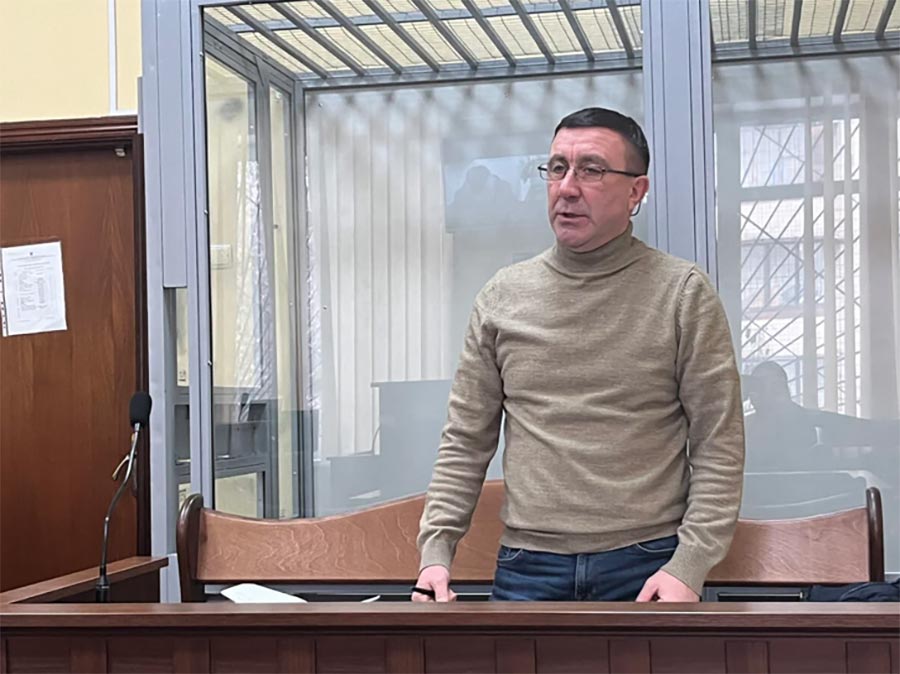
What did Fedorian know?
“Did you receive any direct requests from the FSB officers to provide them with vehicles?” the judge asked.
“I would first receive a call from the CEO [Kuznetsov] saying, ‘the operational headquarters will contact you and tell you what kind of vehicles to provide. Give a command to Achkinazi to assign those vehicles. Transmit him my instruction to assign the vehicles’.”
“Didn’t the CEO communicate directly with Achkinazi?”
“The director is a young, ambitious Moscow fellow who was building Olympic buildings in Sochi. He considered it, pardon my rude word, a ‘disgrace’ to communicate with a former police captain such as Achkinazi. He felt he should communicate with colonels and generals. We had several retired generals working for us, by the way. So, he would give me a directive, I would pass it on, and then Achkinazi had better do it... I did not provide vehicles twice in 2013 and 2014 [to Ukraine’s SBU]: I knew how it would turn out for me if I did not fulfil the directive.”
“Was Achkinazi your subordinate?”
“No. He was when I served [in the police]. But he was not my subordinate at Chernomorneftegaz. He is a subordinate of the deputy general director for relations with state authorities and security service.”
“Did the head of Chornomornaftogaz have some sort of psychological problem that meant he couldn’t give the instruction directly to Achkinazi?”
“Such an arrogant man. He wouldn’t even look at those inferior to him or consider it necessary to communicate with them. Achkinazi was a simple captain.”
“Are you aware of the searches conducted on June 10, 2019, including the one of Riza Omerov’s house in Belogorsk?”
“I found out about it in the course of the trial.”
It was during this particular search at Omerov’s home that a white Mercedes was caught on camera, the only Chornomornaftogaz vehicle identified.
“Can you elaborate on this?” continued the judge.
“I can’t elaborate on anything. I had nothing to do with it. I was not participating in the searches. I did not know that the searches would be conducted. I did not track the use of the vehicles provided to the operational headquarters because I was not interested in it. For the record, this Mr Omerov is a Russian citizen as well. There is a printout from the website of the human rights group Memorial showing that he is a citizen of the Russian Federation. I have nothing to do with these searches, yet I must defend myself and challenge the information and speculations of the investigation. Not a single document that would prove pro-Ukrainian views of the people who were searched was included in the case files.”
A retroactive charge?
The judge asked whether the accused knew about the searches of Crimean Tatars from the media. Fedorian replied that the case file had copies of the publications by Crimean Solidarity and Radio Liberty included as evidence. According to him, these media outlets do not have any particular popularity in Crimea. He would occasionally watch TV in the evening but did not keep a close eye on the searches.
Fedorian claimed that Russia’s security service never reported the purpose of taking the vehicles, and he never met the FSB officers Pavel and Valeriy in person. There is correspondence on his phone between him and Pavel regarding a former mayor detained in Crimea for corruption, but the accused contested it had any evidence value to the case.
The defence also pointed out that Hizb ut-Tahrir had been persecuted in Crimea even before the annexation. Fedorian quoted 12 publications in which the heads of the Ministry of Internal Affairs of Ukraine, the Security Service of Ukraine, parliamentarians, heads of the Majlis and the Spiritual Directorate of Muslims of Crimea all described Hizb ut-Tahrir as an organisation that threatens the state of Ukraine and traditional Islam.
During the arguments, lawyer Oleksandr Omelchenko said that his client’s actions were more consistent with collaboration crimes. Namely, that he allegedly provided vehicles to armed groups in the temporarily occupied territory. But he stressed that in 2019-2020, the Criminal Code of Ukraine did not include such a crime. The legislation was amended only after the full-scale invasion.
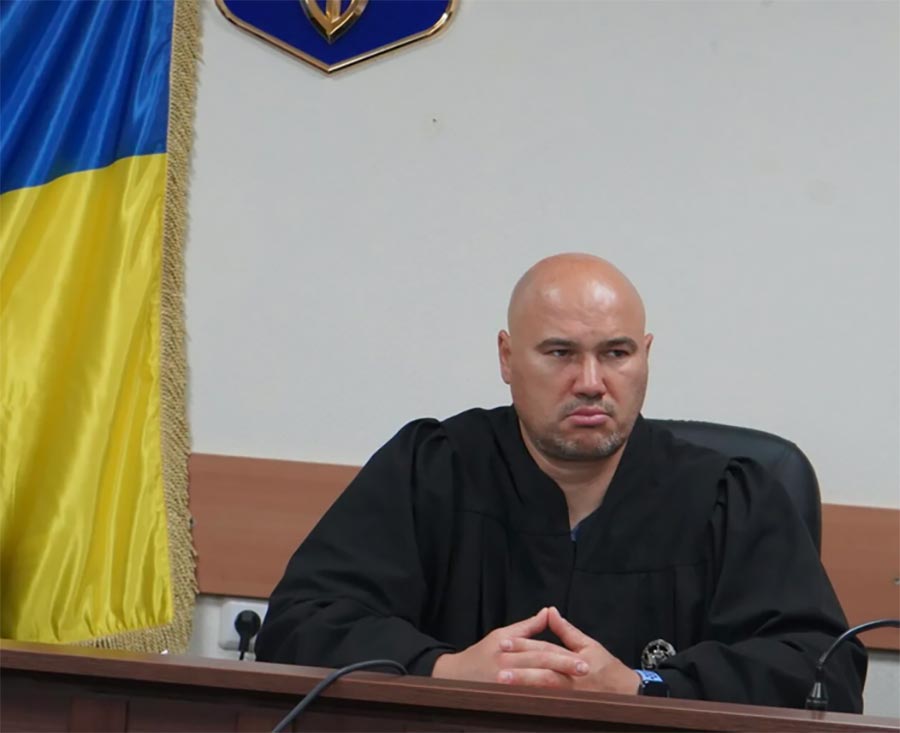
The war that interrupted Fedorian’s exchange
During the court hearings, Fedorian repeatedly mentioned Oleg Kulinich, who was the head of the Crimean SBU at the time of his arrest in 2020. He speculated that his detention was Kulinich’s way of making it look like he was working. Kulinich is now also on trial for treason. According to the prosecution, by the time Fedorian was detained Kulinich was already working for the Russian FSB.
Fedorian also allegedly heard from SBU operatives that he was detained to replenish the exchange fund of prisoners. An SBU officer named Stas even bragged that after detaining Fedorian, they could safely stop working for a year. Fedorian expected to be quickly exchanged due to his high profile and signed an agreement to the exchange on February 21, 2021. In March, the case was submitted to the court. The first 5 to 7 court hearings were postponed pending the exchange. The court hearings were then attended by the Russian consulate representative in charge of the exchange. But then the process slowed down for some reason, and it all collapsed with the outbreak of the full-scale war in February 2022.
In his final speech, Fedorian said that his greatest grief was the loss of his parents, who died while he was in detention and whose funeral he could not attend. He urged the judge to look at his case as if it were his own, to imagine himself in his place. He stated that over the years, no less than eight judges of different levels had shared a cell with him. All of them allegedly reviewed his case file and said that no crime was established.
“Unfortunately, we live in such a time when a judge must have real courage to render a just verdict. Your Honour, I wish you courage. And I ask you to remember that not only the life of a person is in your hands – and I am 64 years old... 13 years would basically be a death sentence –, but also the life and fate of my relatives and loved ones. I rely on your fair judgment,” the accused said.
Guilty beyond reasonable doubt
On Friday, October 18, Fedorian was not brought to court. He listened to the verdict via video link from the pre-trial detention centre. A short version of the decision was read out. It stated that Fedorian was found guilty and sentenced to 12 years in prison with confiscation of property.
In his full decision, Judge Oleksandr Boyko concluded that all the evidence provided by the prosecutor was sufficient to find Fedorian guilty beyond a reasonable doubt. The Ukrainian court refused to consider documents provided by Chernomorneftegaz or by the occupation authorities as evidence. “The jurisdiction of the Russian Federation does not extend to the Autonomous Republic of Crimea, and therefore, the documents and instructions issued by the occupation authorities do not constitute evidence under the CPC [Criminal Procedure Code] of Ukraine,” the decision reads.
When the judge left the courtroom after a brief summary of the full decision, Fedorian angrily shouted that he did not understand a word of it.
This report is part of our coverage of war crimes justice produced in partnership with Ukrainian journalists. A first version of this article was published on the "Sudovyi Reporter" website.




